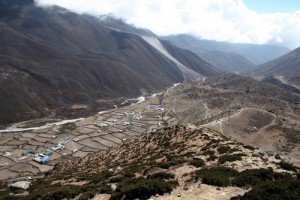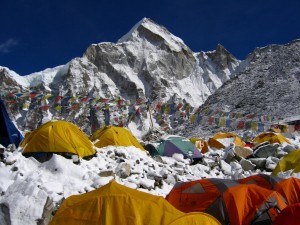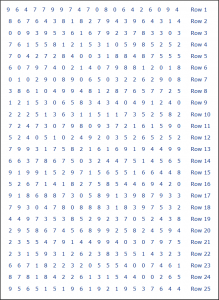So it is exactly two months before I leave for Mt. Everest and I figured I should try to describe, to the best of my abilities, what my trip will be like. So over the next few weeks I will be discussing my itinerary, the gear I'll be using, the challenges, etc.
I'll start with March 26th when I leave, arriving in Kathmandu, up until I reach Everest Base Camp.
A lot of people don't know this, but when climbing Everest from the south side (in Nepal), it involves a long trek to get into base camp. So you're essentially hiking for a good 8-10 days in backcountry and through small Nepalese villages before you even encounter some snow, and then of course, Everest Base Camp.
I'll be flying to Kathmandu leaving from Miami, FL on the 26th of March. I go: Miami, FL -> Raleigh, NC -> London, UK -> New Delhi, India -> Kathmandu, Nepal....with a whopping total travel time of around 36 hours. Yuck. It's gonna be loads of fun. I'm sure I'll be wishing I never chose to do this thing by then, haha.
So I'll get to Kathmandu on March 28th, where I'll be met by the others who are apart of the same expedition me. I'll be joining an expedition group run by Peak Freaks, a Canadian based expedition outfitter. They are awesome. Tim Rippel, the head honcho, is a climbing legend and has gained a pretty wicked reputation because of a daring rescue he did above the death zone in 2008. Simply put, he is bad ass. You can read about the rescue here. There are 11 climbers, 3 main "western" guides, and a team of 26 sherpas. SIDE NOTE: I'm excited to memorize all their names :D
Anyways, once the whole team (the 11 of us) has arrived, on April 1st we fly from Kathmandu to Lukla, where one of the world's most dangerous airports lies hanging off the edge of a mountain in the Khumbu Valley. I've been told that when you fly in for the landing it seems as though you are going to crash straight into the side of the mountain. The runway is actually uphill to slow down the plane once it lands. Great. It's supposed to be even crazier when you fly out; just speeding straight off the edge of the cliff. James Bond style.


Our first retreat for the night is in a small nearby village called Monjo, which sits at an elevation of about 9,000 ft. The next day we trek onto one of the larger villages in the valley, Namche Bazaar (at an elevation of 11,200 ft). Surprisingly, it has some pretty modern amenities for where its located: restaurants, internet cafes, and places to buy food and gear. It's technically one of the last places I'll find some signs of modern civilization before getting to base camp.
Next up, we make the trek onwards to the village of Tengboche (12,600 ft). Along this trek is when we start to see great views of the massive peaks of the Khumbu Valley: Everest (duh!), Lhotse (4th highest in the world), Nuptse (a 7000m high peak), and Ama Dablam (a peak that looks like its straight out of a Tim Burton movie). Spend a night there, then the next day move up to the village of Dingboche (14,800 ft). Keep in mind that the highest peak in the continental US is Mt. Whitney at about 14,500 ft. That should give you an idea of how high these villages are in the Khumbu Valley. It's around this point in the trek where altitude sickness can really start to disabilitate some of the team. Some will be fine, some will need to slow it down a bit, and some might even be sick already. It's all about how you acclimatize. Slow and steady is usually the name of the game. The next few days, we'll take a couple nights sleeping at the same elevation, just to keep our bodies in check.

We trek up a little higher the next day to acclimatize some more but then come back down to sleep in Dingboche. The day after that, we hike up to a collection of lodges called Lobuche. Which, if I'm correct, is near the peak called Lobuche (a 20,000 ft peak?). To acclimatize some more, the next day we will hike up Kala Pattar, an 18,000 ft peak that is basically another exercise in acclimatizing our bodies.
One more night in Lobuche. Then finally, we trek up to Everest Base Camp (17,500 ft). My home for the following 2 months. A village of tents. From what I've heard, Peak Freaks sets up their camp the closest to the Khumbu Ice Fall (more on this obstacle next time), which is cool, because we get to see everyone as they pass by before they climb. There is gonna be a ton of climbers at Base Camp, but I'm excited for a pair of climbers that will be climbing with the famed HimEx (they are the cool guys on that Discovery Channel show, Beyond The Limit): Steve and Sarah. They are Welsh, so they have pretty sweet accents. I climbed with them on Mont Blanc last summer, and they are raising money for UNICEF....check them out here. SIDE NOTE: From what I've heard, Discovery Channel is not filming this year (bummer)...I was hoping I'd make a small cameo.
Stay tuned! The Khumbu Ice Fall is next....










